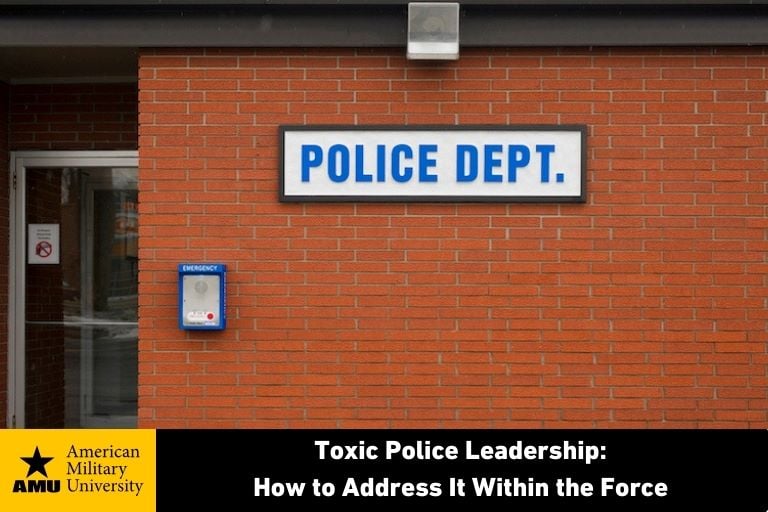By Dr. Jarrod Sadulski | 06/28/2024

At some point in your career as a law enforcement officer, you will inevitably deal with a supervisor who creates a toxic work environment. In fact, law enforcement is especially susceptible to these types of bad supervisors.
Toxic leaders, however, are not helpful in an environment that is already inherently stressful due to the life-and-death nature of police work. Police officers are often subjected to traumatic events, but good leaders with integrity and caring can ensure high morale and mitigate problems to officers' well-being.
Why Toxic Leadership Creates Problems for Police Officers
Poor supervision in a law enforcement agency creates a sense of mistrust. Law enforcement officers in the field often develop an us-versus-them mentality that impacts their work performance.
If a bad supervisor creates tension between fellow law enforcement officers, for instance, this tension can result in reduced safety for everyone, because officers can become preoccupied with infighting among their coworkers. In field situations where quick reactions are often essential to preserve life, that discord could also lead to officers not backing up each other, bullying, and other similar problems.
Safety Risks Arising from Supervisor-Induced Tension
Toxic leaders lead through a fear of career retribution and the power of their position, instead of using effective leadership styles. By contrast, effective leaders set a good example for their subordinates, display empathy, and foster motivation in subordinate police officers. These types of leaders create a positive police culture where officers enjoy coming to work because they know that a good supervisor has their backs.
The Consequences of Toxic Leadership Styles
Toxic law enforcement leaders purposely create conflict in the workplace, which creates instability. They are quick to pin their own mistakes on subordinates to make themselves look good to the chain of command, instead of taking ownership as a leader when they make mistakes.
In addition, a toxic leader prevents subordinates from using their own discretion to make decisions, demoralize employees, and create disincentives to work hard.
However, toxic leadership in the workplace is easy to recognize. It appears through high employee turnover, increased use of sick time, disgruntled behavior, and poor job satisfaction.
How to Deal with Toxic Leadership
When you’re dealing with bad supervisors in leadership positions, especially in a police department, it is best to use emotional intelligence strategies to minimize risk taking. These strategies include clear and direct communication, responding to problems calmly and without emotional escalation, and accepting critiques constructively.
By doing so, you can navigate a toxic situation more effectively. Ideally, you don’t want a toxic leader to impact your morale, job performance, or safety.
Identify the Source of Tension
For public safety officers in a toxic work environment due to a poor supervisor, it is important to first realize that it is the supervisor creating the tension. Ideally, you should identify ways to find mutual ground with a toxic supervisor.
Often, bad supervisors create a toxic environment because they are overwhelmed and under-prepared by work-related circumstances. In these cases, a subordinate can take a collaborative approach with the toxic leader to resolve conflict.
Navigate Self-Interest and Flexibility
Toxic leaders are often unable to be flexible and unable to focus on the best interests of subordinates above their own self-interest. In this case, remember that working with a toxic leader is hopefully only temporary and staying off the supervisor’s radar is best.
Handle Inconvenient Demands and Poor Decisions
A toxic supervisor may require that reports be submitted at an inconvenient time or may make ill-advised decisions in the field when a better way is available. Instead of butting heads with toxic supervisors, follow their guidance as long as it is within policy. A toxic supervisor is unlikely to be open to subordinate feedback on how things could be done better and addressing improvements to processes is only likely to cause irritation.
Resist the Temptation to Put in Less Work for Toxic Leadership
When you’re in a toxic workplace, it is human nature for you to put in less effort. However, this temptation should be resisted. Continuing to work hard despite low morale places your career in your own hands and reduces the ability of a toxic supervisor to manipulate you.
Executive Management Is Responsible for Mitigating Toxic Law Enforcement Leaders
Executive management should take steps to mitigate toxic supervision within their ranks at the police department. This goal can be accomplished by enabling disgruntled, unhappy officers to privately speak with members of the chain of command about a faulty workplace. For such conversations, subordinates should have clear examples and a well-structured argument for how and why a toxic work situation exists.
Executive leaders have a responsibility to hold supervisors accountable for their poor leadership style and subordinates’ morale. Executive leadership should also utilize workplace climate assessments and 360-degree supervisor evaluations that enable their subordinates to provide input into their supervisors’ leadership.
Overall, toxic leaders in police departments create stress and other problems for officers who already deal with life-and-death situations in their daily work routines. For these officers, it is essential to not take the outcomes of poor leadership personally and not allow a toxic workplace to create further personal stress, which could affect personal health, public safety, and family life.
Instead, subordinate officers should seek opportunities to ensure that executive leaders are aware of the problems toxic leadership is causing at work. Officers should remain focused on providing the best possible policing services and, if feasible, distance themselves from the toxic supervisor by seeking other units within a police organization.
Criminal Justice Degrees at American Military University
American Military University (AMU) offers several criminal justice degrees, including:
- An online bachelor of arts in criminal justice
- An online bachelor of science in criminal justice
- An online master of arts in criminal justice
These programs provide a comprehensive understanding of the criminal justice system, including U.S. law enforcement, criminology, investigations, law, and community relations. The programs are designed for adult learners interested in safeguarding community members and working professionals looking for professional development and to gain greater expertise and insights into juvenile issues, criminal behavior, and corrections.
Students learn from experienced faculty with backgrounds in government, military, public safety, corrections, and the private sector.
Bachelor of Arts in Criminal Justice
The bachelor of arts in criminal justice aims to provide students with a thorough understanding of the criminal justice system.
The learning objectives include:
- Examining the differences among local, state, and federal criminal justice systems
- Understanding political and public administration aspects
- Applying prevailing theories to criminal justice
Students have the opportunity to design research projects that will contribute to the field and explore how evidence and law standards impact professionals within the system. The coursework is designed equip students with critical analytical skills and a comprehensive view of the criminal justice field.
Bachelor of Science in Criminal Justice
The bachelor of science in criminal justice is designed to equip students with a deep understanding of the criminal justice system, focusing on analytical and problem-solving skills.
The learning objectives include mastering crime scene investigation techniques, understanding forensic science, applied psychology, and comprehending the adjudication process. Students may participate in coursework that emphasizes critical thinking, ethical decision-making, and effective communication within the field of criminal justice, potentially preparing them to seek for diverse roles in law enforcement and related areas.
Master of Arts in Criminal Justice
The master of arts in criminal justice aims to help adult learners to develop advanced professional skills to seek leadership opportunities in the criminal justice field. Students have the chance to learn to distinguish between major systems of criminal justice and their interconnections, analyze theories of criminal behavior, evaluate emerging threats like terrorism, and assess the rule of law's impact on social reactions to crime. This program emphasizes critical thinking and practical application, preparing graduates to address complex issues within the criminal justice system.

Dr. Jarrod Sadulski is an associate professor in the School of Security and Global Studies and has over two decades in the field of criminal justice. He holds a bachelor’s degree Criminal Justice from Thomas Edison State College, a master’s degree in criminal justice from American Military University, and a Ph.D. in criminal justice from Northcentral University.
His expertise includes training on countering human trafficking, maritime security, mitigating organized crime, and narcotics trafficking trends in Latin America. Jarrod has also testified to both the U.S. Congress and U.S. Senate on human trafficking and child exploitation. He has been recognized by the U.S. Senate as an expert in human trafficking.
Jarrod frequently conducts in-country research and consultant work in Central and South America on human trafficking and current trends in narcotics trafficking. Also, he has a background in business development. For more information on Jarrod and links to his social media and website, check out https://linktr.ee/jarrodsadulski.

